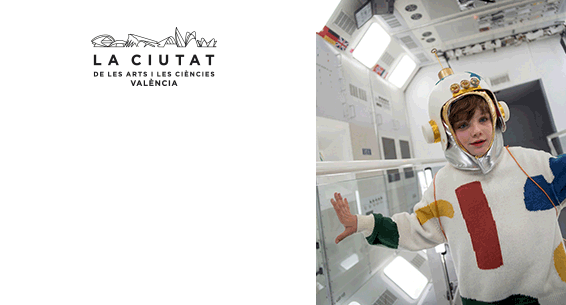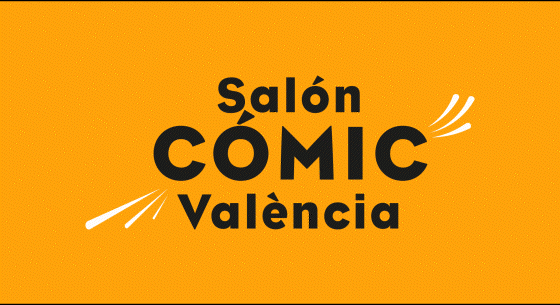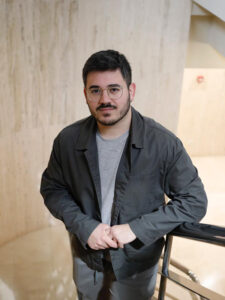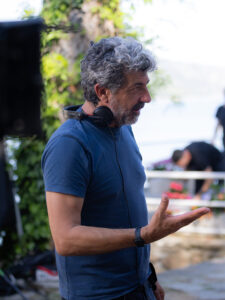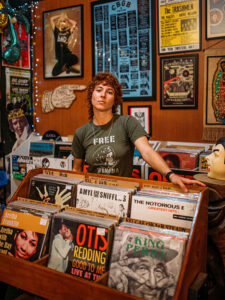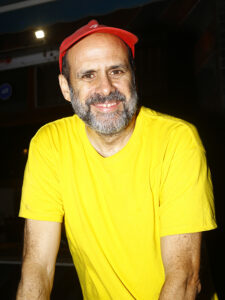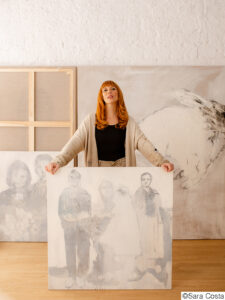
After several years living in New York, Noemí has returned to Madrid, his hometown. Noemí is an actress by profession. Upon his return, is introduced to some castings, but, in the background, she feels disoriented, insecure and doesn't know what to do. Searching for his way in a world that he perceives no longer belongs to him after so long of absence, resumes relationships with his family (his sister and his sick grandfather) and with old friends. With them he shares his concerns for the present and for a future that, despite having passed thirty, it still seems uncertain. Actually, Naomi doesn't even know who she is., If you want to come back completely or leave again. Definitely, what is your place. This conflict, will cause a strong confrontation between life, already organized, of those around her and herself who, suddenly, has become a strange element, a distortion. This is the premise of The art of returning, debut film by Madrid director Pedro Collantes that premieres this Friday 11/12 in movie theaters. We chatted with the director about his work a few moments before the presentation of his film at the Babel cinemas in Valencia.
While watching your movie I thought that, not so long ago, with the global economic crisis 2008, In the cinema, many stories emerged of a generation that had to leave to find its place or a job in another country.. Now, however, stories emerge, like yours, that point to the return. what has happened?
Yeah, tienes razón. Es una historia de regreso, definitely. Y en este caso concreto sí que se puede contextualizar como has hecho tú. La película no es que sea autobiográfica, no está contando mi vida ni cosas que me han pasado directamente a mí, but, a la hora de escribirla, puse mucho de las experiencias personales de gente que había pasado por eso. Yo también me fui al extranjero en el 2008, estuve casi nueve años viviendo fuera y, al volver, pasé por ese proceso, que es un poco abstracto y que tiene que ver con retomar la vida que se ha quedado, con cómo reencontrarte con un lugar que es tuyo, pero que ya no es tan tuyo, y con todas esas relaciones que han quedado congeladas en el tiempo. There is a period of re-synchronization that is strange and strange, and?, talking to friends who have been through the same thing, It inspired me to try to put a frame on it and portray it through film.. Yeah, indeed, can be put in that context, but it is also true that I think it is very universal. I'm referring to those people who are going to live abroad., without it being abroad or for economic reasons, that may be beyond the specific context of this exodus caused by the economic crisis of the 2008.

In that more general sense, I was thinking that it is true that it was not a process exclusive to our country, and perhaps it has more to do with certain globalizing trends or with this new Europe that we are building.. About all this, while watching your movie the idea occurred to me, if anything, with so much coming and going from one place to another, perhaps we have been left without our own place in the world. I think if it is, precisely, that feeling of not having a specific place which affects the protagonist.
Yeah, I think so. Indeed, What you describe may be a twenty-first century syndrome.. Yo, For example, soy millennial, but I'm one of the last, let's say (laughter) But among the youngest there is that of learning English, travel, that experience of going around the world (although this year everything has been more restricted). But, Yeah. I think it may be a syndrome of this generation, being from everywhere and, at once, of none. Of having lost that feeling of home. And Naomi, the protagonist, suffers a little from that of being here and there, and be neither from here nor from there, not feeling at home anywhere, and he walks as if searching for his center.
Do you think there is now a longing for that place? Maybe it's the idea of country, something that before we had clearer or better located. This was my country, with these borders, and this was my place in the world. Is there any of that?
Of course, in the film and in the portrait of the protagonist, Yeah. But I don't know if it has to do with national or local., in this case with the city of Madrid, but it has to do with a more abstract term, with the idea, the concept of feeling part of a place, of a place to call home and to feel like you belong one hundred percent. In that sense, Yeah. I was interested that, in the movie, that longing will show, that thing like nostalgia, of melancholy for the things that time has caused to mutate and that are already as if irrecoverable.
Do you consider nostalgia as a burden, a load, in this case, to get ahead?
Well I don't know, the truth. So, in general terms, as if you had a weight in life, I don't know. I think it has its good side, I think it's nice to be able to remember things fondly., to miss them. But it is a double-edged sword because it can also lead you to sadness.. However, When it is well focused it is easier to keep the good and the illusion. In the film, I believe that her conflict has a lot to do with how to refocus that nostalgia., con cómo convertirla en la aceptación de lo inevitable, what, si hay cosas que cambian y se acaban, hay que enfocarlo desde lo positivo.

Hay una pregunta que no se formula y que me da la sensación de que planea todo el tiempo sobre el relato y que tiene que ver con el hecho de saber quién es uno mismo. Creo que Noemí lo va redescubriendo a través de los demás. ¿Necesitamos a los otros para descubrirnos?
Yeah, indeed. It's like this. En la película está todo eso que hemos hablado de volver, el proceso del regreso y de encontrar el sitio, y luego está otra capa, que está muy atada a la primera, que es la cuestión de la identidad de uno mismo. And that is something just as elusive and elusive as the concept of belonging somewhere.. This happens to Naomi. who am i? Am I how my sister defines me?? Am I how my grandfather defines me?? Am I how my friend defines me? All the characters that we know from her life and that she encounters on this day define her by the look they project on her.. And she reacts to those definitions. In the end, My intention was to give us a kaleidoscopic portrait of her., that we were seeing their different faces and that, at the end of the movie, there would be a self-control process, as if to say, “bueno, “Now I am the one who is going to control my identity and I am going to define myself as I want.”
While watching the movie I thought about that popular phrase, what does it say: “He who goes to Seville loses his chair” (laughter) This is something that happens to Naomi.: She's gone and everyone has taken the places she occupied.. But, at once, It is something that is also in the way the film is shot., in how you portray spaces. I wanted you to tell us what your work has been like in that sense..
In this case it would be “the one who went to New York, "He lost his chair." (laughter) Yeah, exact, there is something to that. It's like that phrase your friend says to you in the art gallery.: “It is worse to feel nostalgic for the things you have not dared to do”. Her conflict also goes there. In the end, en la vida vas tomando decisiones y el decidir hacer una cosa implica, por definición, decidir no hacer otra. Y, por esas cosas que no haces, al final puedes estar siempre obsesionado con la idea de qué habría pasado si hubiera hecho lo que no hice en lugar de lo que sí que hice. Eso es lo que le pasa a ella, que vuelve y se encuentra con que tenía una relación con un chico, pero ahora es su amiga la que está con él. Como tú dices, han ocupado su lugar y ella se va dando cuenta. Esas micro-decisiones que fue tomando en su momento, ahora se han convertido en macro.

La película se construye en base a secuencias que son bastante largas. No sé si me equivoco, but I have counted twelve scenes or situations in a film that lasts ninety minutes. Your movie plays, in this way, with a kind of counter-time or counter-rhythm, if we compare it with a cinema, in this sense, more conventional. How was the construction of that time?? Was this something you had in mind beforehand when writing the script or did it develop later in filming??
It was in the script. In fact, It was key to make that decision. The film has been developed through the Venice Biennale program called La Biennale College Cinema, What is it to make micro-budget films?, and we had to come up with the idea of a film that could be made with those limitations, which are a very tight budget 150.000 €, That is what they give you and that you cannot complete with anything else.. That greatly restricts the amount of time you have to shoot.. In our case, we only shot eleven days. Thinking about how we could make a film in such a short time and with such a limited budget., For me the challenge was to find a formal approach that fit organically within those limits., that is to say, don't try to do more than you can be. And that's where the decision arose for the film to be a collection of long scenes., of long slices of life in which we are not going to do the typical short transition scenes, But we are going to try to feel the passage of time together with the protagonist, and be able to know, So, well enough to the people in your life that you are going to spend time with. That was the formal bet of the film.
There is one thing that made me very funny and I suppose it is intentional., and it's the game you play with the title of the movie itself. Normally the title of the film is a phrase or a motto that inspires the meaning of the film., but, in this case, It is inside the movie in a meta-narrative game that I liked. I'm referring to that moment when Noemí is with her friend and tells him that she is going to make a series called that., The art of returning. He tells her that it is a very corny title and that has suggested to me the idea that, with that, It seemed like you were asking the viewer about it.. How did that game come about??
Yeah, in this thematic layer of the film that we have discussed about identity and how you define yourself, we made the decision that our protagonist would be an actress. He is a person whose vocation and profession is to be many identities, know how to be many people who are not her. And then the thing arose that there was a kind of meta-fiction. She has to make a series of decisions in her real life., like Naomi, but part of those decisions are being a character in this series for which an opportunity has arisen. But he has a dilemma because, in principle, It is a project that she would not be interested in.. On the other hand, is at a point in life where, probably, she prefers to feel like an actress and work, even if it is in a project that is not so good, and he's trying to convince himself. That's where the idea came from to build that fiction within the film, which is the series for which she is hesitating whether to go to the casting or not and which is called The art of returning, which is the same title of the movie. Thus, What happens to the character in the series has an echo with what is happening to her and is reflected in that moment in which she talks about taking a turn. 180 degrees to your life, what is happening to him. Noemí is making the decision to take a turn 180, What is it to return to Madrid?, but, at once, In fact, son 360 degrees because, first, were the 180 to leave, and now they are 180 return. Y de ahí lo de jugar todo el tiempo con esas dos capas que se unen al final, en la escena del taxi, cuando ella decide jugar a ser ese personaje de la serie con un extraño que no la conoce y, therefore, no puede saber que está mintiendo, que está interpretando un papel. Es gracioso porque Dani [Remón], el co-guionista, me too, tuvimos el título mucho tiempo en duda. ¿Nos gusta o no nos gusta? Y siempre estábamos, “no, pero es cursi”. “O no, es bonito”. In the end, decidimos, “mira que lo digan los personajes, que haya un personaje que diga que es cursi y otro que diga que es bonito”.

Me lo estabas contando y no me sorprende porque, mientras veía la película, me pareció que se lo estabas planteando al espectador, as if saying, "Yeah, I know that some of you may think that it is a cheesy title and others that it is nice, But I tell you this way so that you know that I know.” (laughter)
Of course! But because it is also the dilemma that Noemí is in.. She is thinking, "It's true, the series, as my friend says, It's very cheesy and it's telenovelesque.". But, on the other hand, think, “but it's pretty”. And why not be an actress in one of these series, although it is very mainstream, but they reach many people?
In the end, our identity is also a construction, we could say. I'm referring to that taxi sequence.
Yeah, In that sequence, what I liked and what I was looking for is that she has been with people from her life with whom she has had a lot of history and, therefore, has a lot of past. These are people who have a look on themselves that is already tainted., who define her because they have known her for a long time, because of how she has been throughout her life. But, suddenly, She finds herself in the bubble of being in a taxi with a stranger who casts a totally virginal gaze on her., a view free of prejudices because, since he doesn't know her, can tell you anything. And he tells her, “but you are very strong, I see it for you”, Which is ironic because we just saw her completely break down.. In that sequence, I was interested in the fact that identity is something totally changeable and that she was also able to play with that..
In your film the music sometimes serves as a transition, but I would say that the real protagonists are the silences. There is a lot of dialogue, but what marks the sensations are the silences between phrases, in the breaks. For me, Those pauses determine the tone of the movie. How did you work on that aspect?? I ask this because it seems to me that it must have been difficult to maintain that tone., especially with that game, in such long sequences.
Well yes, being very long, and almost all with a lot of dialogue, It was key to find the internal rhythm of each sequence. This was about finding moments of silence, the little breaks. In my case this is a very progressive job. In the script I try to be very precise. I put a lot of notes like “pause” or “brief pause.”. My scripts are full of it., something that catches the actors' attention. When I write dialogues, which is what comes easiest to me and what I enjoy the most, I read them to myself out loud and feel the rhythm. So, when I see that a pause is good, I write it in the script itself. Pongo, “a very long pause that is uncomfortable” (laughter) Then, when you start rehearsing, ves, of those notes, which ones are really working, where you need other breaks that you had not put or, on the contrary, if you should remove any. And then, editing has that magical thing in which one can manipulate the times a lot to fine-tune the duration.

In that sense, How has working with the actors been?? I say it because, having to be the ones who must set that tone, I was interested to know what your relationship with them was like..
Well look, I feel that my responsibility is to deliver the script as accurate as possible.. That is to say, that the character, the tone, the rhythm is as marked and directed as possible from the text. I could say that, in the way of writing, there is already a lot of acting direction. In that I am very detail-oriented and I look for precision a lot.. And then I also put a lot of effort into the casting, that is to say, I struggle a lot to choose well. In this case, I was very lucky because everything I had chosen said yes to us, which was fantastic. Then, I give it to them and I like to see what proposal they come up with.; see that virgin proposal, without me interfering. Since what I can interfere with is very marked in the script, I like to see how they interpret it. After, in rehearsals, we are modulating. In this film I have had tremendous fortune because the entire cast is very good., and they are all tremendous actors and actresses, and it has been a luxury to work with them. The truth is that, in this movie, We didn't have much time to rehearse.. Macarena rehearsed once with each of the characters,
I don't know if we can talk about it without revealing it., but, to finish, I wanted you to comment on that last shot of the movie. I am referring to that interpellation to the viewer, that direct look. It is very powerful. What were you looking for with it??
It is very difficult not to make a spoiler (laughter). But it has to do with what we mentioned about being a film that has a lot of dialogue and silence.. It is a film in which there is a lot of talk and, in those dialogues, people define her. All the characters say something to him. The sister tells her “you are strange”. The friend comes to him and tells him “you are a little selfish.”; you leave, you come; when you want you are, when not, no”. The taxi driver tells him, “you are strong”. Everyone defines it and for this the word is used a lot. So, It seemed very nice to me to reach an ending in which there are no words, only silence, and that he expressed that definition with his face. And that there, only on the face, we could decide what is the correct definition of that person, without putting an adjective. Nothing else.



